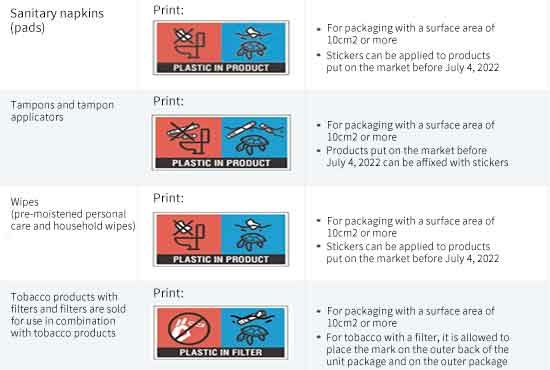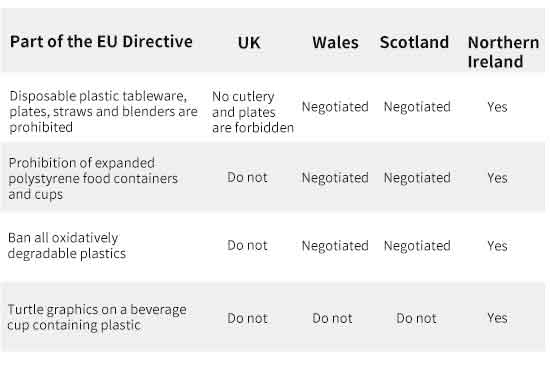The Single-use Plastics Directive (EU) 2019/904 was issued in June 2019. EU member states must implement these measures no later than 2 years after the directive takes effect (from July 3, 2021), and decide how to incorporate them The laws of the country. In this directive, countries have different regulations on whether biodegradable plastics belong to the scope of the single-use plastics directive. Regarding the scope of supervision of products, the EU has made detailed regulations.This applies to:
Tableware, plates, beverage stirrers, straws, balloon sticks and cotton swabs, as well as cups, food and beverage containers made of expanded polystyrene. Oxo-plastics (oxo-plastics) have been banned and placed on the market.
1.Germany: Regulate the labelling of single-use plastic products
"We want to prevent people from accidentally discarding plastic packaging and items," said Svenja Schulze, the German Federal Environment Minister. "Because disposable products, in particular, end up in nature or enter the sewage system too frequently. In addition, consumers usually do not know that certain products contain plastic. This is what we clarified through the new label." From July 3, 2021, these warnings will be integrated into the packaging layout of plastic products in a clearly identifiable manner. Starting in July, manufacturers that contain plastic products will no longer be allowed to sell unlabeled products. The label consists of pictograms and text that identify the corresponding product category. The first products to be marked are hygiene products, such as sanitary napkins, tampons, tampon applicators and wet wipes, as well as tobacco products with plastic filters or plastic filters used in tobacco products, and disposables drink cup.

The European Parliament stipulates that for single-use plastic products that are not within the scope of the ban, corresponding labels need to be affixed.
2.United Kingdom: Different levels of enforcement of instructions
Although the UK does not need to incorporate the directive into its own laws, all four countries in the UK are adopting different methods to reduce plastic pollution.

A closer look reveals that England did not implement the directive. However, the British government hopes to use other policies to reduce the use of single-use plastics-such as its waste and resource strategy. As early as October 1, 2020, the United Kingdom legislated to restrict the use of disposable plastic straws and stirrers. The regulations stipulate: From October 1st, traders must stop supplying disposable plastic straws, cotton swabs and beverage stirrers in the UK, except for special purposes.
Exceptions include, but are not limited to:
In special places such as registered pharmacies, schools and hospitals, plastics are not prohibited. In restaurants, bars, canteens, food trucks and other food suppliers, disposable plastic straws and food and beverages can be provided for immediate consumption. However, they must: 1. Put the straw in a place where the customer cannot see it or let the customer take it by themselves 2. Only provide the straw to the customer who has the request.
3.Italy opposes EU's single-use plastics directive
Italy particularly opposes the EU's ban on single-use plastics. Italian industry is at the forefront of the biodegradable bioplastics industry in Europe, and some believe that these industries will be harmed by the ban.
Roberto Cingolani, Italian Minister of Ecological Transformation, said: "Europe has a very strange definition of plastics. The exceptions in the directive include only recyclable plastics. All others, even if they are biodegradable or they are additives to something, they are not good. Our scientific community is a world leader in the development of biodegradable materials, but they cannot yet be used by industry because of a new and absurd European directive. "
For the Italian government, with the authorization law No. 53 approved by the government, disposable items made of compostable plastic are still outside the supervision, and disposable plates, cutlery, straws and food containers are still allowed.
4.Cyprus: The SUP directive has not yet been translated into national legislation
According to Charalampos Theopemptou, chairman of the House Environment Committee and leader of the Green Party, Cyprus is far from ready. A bill designed to translate the SUP directive into national legislation has not even been submitted to the House Environment Committee for discussion. "Even if it is discussed as an urgent matter, assuming there are no objections, it will take four to five weeks to submit it to Parliament," Theopemptou said. In this case, the objection is affirmative, because the business community has stated that they will require a transition period so that they can at least use up the inventory in their warehouses last year.
5.Portugal: The directive has been passed and will be implemented soon
The directive is mandatory in all EU member states. In addition to other products made of or using plastic, tableware, straws, cotton swabs, stirrers, balloon sticks, or styrofoam used in food containers are prohibited.
The Portuguese government has decided to implement the measure last year, mainly due to the expected date of the directive, but the Covid-19 pandemic has delayed the implementation of the directive, and Portugal finally enacted a ban based on the EU's date.
6.Spain: banning the sale of single-use plastic products in stores from July 3
The ban on disposable plastic products set by the European Commission in 2019 will take effect on July 3 this Saturday. The directive stipulates that any products made of oxidatively degradable plastics and microspheres smaller than 5 mm, such as cotton swabs and plastic tableware, plates, straws, drink sticks and cups will be "prohibited" from July 3.

